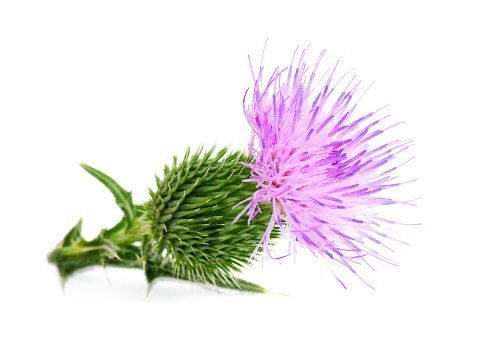Milk Thistle Extract Helps Inhibit Inflammation in Immune Cells?
Euromed has shared new study results suggesting its milk thistle extract may help suppress inflammation in immune cells, including in cells from HIV-positive subjects.
Photo © iStockphoto.com/scisettialfio

Silymarin, an herbal extract made from the seeds of the milk thistle plant (Silybum marianum), may help suppress inflammation in a diverse range of immune cells, including in cells obtained from HIV-positive subjects, according to a new study1. Euromed (Barcelona, Spain) recently shared results of the study, published in PloS One, which investigated the anti-inflammatory action of cells treated with Euromed's milk thistle extract.
In the in vitro study, conducted by researchers at the University of Washington and supported by a grant from the National Center for Complementary and Integrative Health, researchers exposed silymarin to immune cells from chronically infected, HIV-positive subjects, as well as HIV-negative subjects.
Researchers found that treatment with the milk thistle extract suppressed the expression of activation and exhaustion markers of CD4+ and CD8+ T cells from HIV-positive subjects. Those same silymarin-treated cells also showed a trend toward modifying CD4+ T cell memory subsets. Additionally, in cells from HIV-negative subjects, the silymarin treatment showed a trend toward “suppressing pro-inflammatory cytokines from non-activated and pathogen-associated molecular pattern (PAMP)-activated primary human monocytes, and non-activated, cytokine-, and T cell receptor (TCR)-activated mucosal-associated invariant T (MAIT) cells,” researchers report.
Taken together, the results suggest that the milk thistle extract successfully elicited anti-inflammatory and immunoregulatory activity across a broad range for human immune cells. It was also noteworthy that beneficial effects were observed in cells from subjects in both disease and non-disease states, as both HIV-positive and HIV-negative subjects were included.
“In this study, we show that [silymarin] significantly reduces expression of various markers of T cell activation and exhaustion (e.g., CD38, HLA-DR, CTLA4, and PD1), as well as pro-inflammatory cytokines (e.g., IL-6 and IL-18) in PBMCs from chronically-infected HIV-positive subjects,” researchers explain. They concluded that based on the findings, silymarin from milk thistle “appears to modulate multiple metabolic pathways that converge on suppressing inflammation in diverse immune cell types, independent of the inflammatory insult or stimulus.”
Also read:
Teaching Consumers Why They Need Immune-Health Dietary Supplements Year-Round
OptiMSM May Support Immune Response After Exercise
References:
- Lovelace ES et al., “Silymarin suppresses basal and stimulus-induced activation, exhaustion, differentiation, and inflammatory markers in primary human immune cells,” PloS One. Published online February 3, 2017.